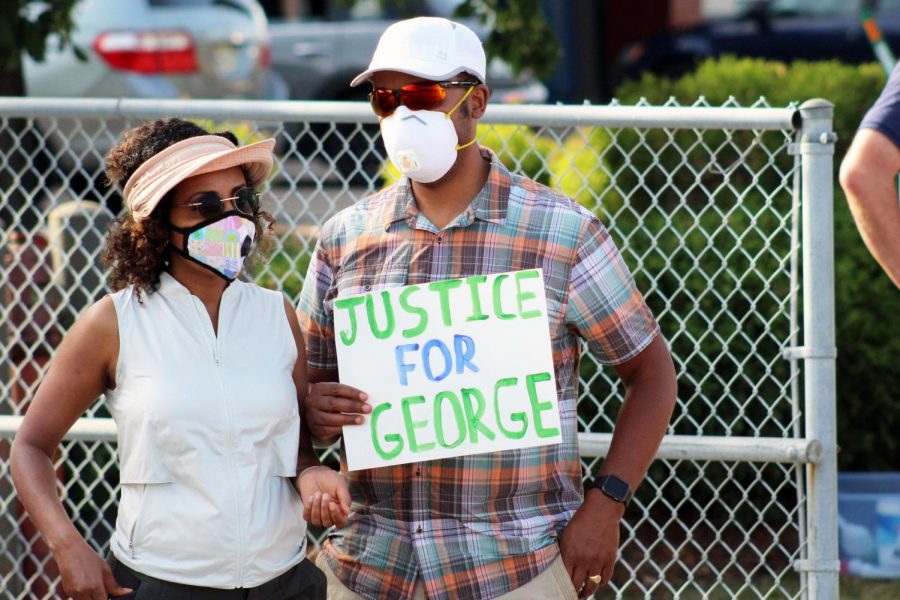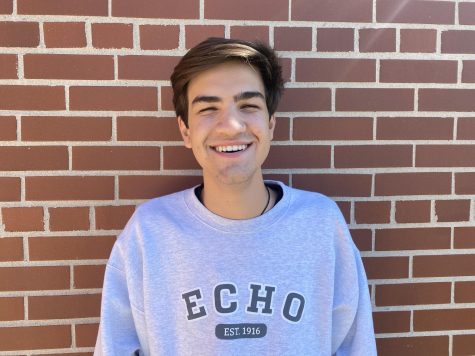Derek Chauvin trial begins
Feelings of doubt, hope emerge
Protesters hold up a “justice for George” sign at a protest June 4. Former police officer Derek Chauvin is being charged for the murder of St. Louis Park resident George Floyd.
March 10, 2021
Attempting to put her emotions aside in fear of being let down later on, senior Grace Kanyinku prepares herself for the trial of Derek Chauvin.
“Until I see the result of (the trial), I don’t really have any super hopeful or super cynical thoughts on it,” Kanyinku said.
Former police officer Derek Chauvin is being charged for the murder of St. Louis Park resident George Floyd, which set off Black Lives Matter protests across the country. Chauvin’s trial began with jury selection March 8, while opening statements are scheduled for March 29.
High achievement coordinator Lee-Ann Stephens said while she would like for Chauvin to be convicted, she is doubtful that it will actually happen.
“Bottom line: I want Derek Chauvin to go to jail,” Stephens said. “But as a Black woman in America and understanding our history of racism and the value that is not placed on a Black man’s life, I’m not hopeful that it might happen.”
While he is hesitant about the outcome of the trial, junior Ezra Hudson believes public opinion is in favor of convicting Chauvin.
“This is the first case where people are like ‘Oh, maybe the police officers are wrong’ or ‘Maybe we should take Black lives seriously,’” Hudson said.
According to Kanyinku, one aspect of the trial that is particularly traumatizing for her is the reposting of the video of George Floyd’s death, along with other videos of Black people experiencing severe violence at the hands of the police.
“I understand knowledge is key, information is key, but seeing it all the time, it hurts,” Kanyinku said. “Everyone posting it all the time ends up doing a lot of harm, especially for the people that look like the people getting beaten in the video.”
Although the conviction of Chauvin would not solve the systemic issues at hand, according to Hudson, it would still provide motivation for those fighting for racial justice.
“(If Chauvin is convicted) that’s not necessarily going to change the justice system, because it’s going to take a lot more than that, but is going to a positive boost of hope, per se,” Hudson said. “It’ll be like they finally got one right.”
Stephens, who is also the advisor to the Students Organized for Anti-Racism club, said she hopes the results of Chauvin’s trial create permanent change, as opposed to the performative changes she saw over the summer.
“For me, what’s so disappointing when it first happened there was this outrage,” Stephens said, “But I feel like that was all performative, it was for optics, because I haven’t heard a lot of those voices anymore.”
For Kanyinku, her work fighting for racial justice isn’t done, even if Chauvin does get convicted.
“Another thing we need to look at is — the justice system worked in this situation, great, but let’s look at why this happened,” Kanyinku said. “Let’s get to the root of the problem and work to fight that.”
For Park students that would like to talk through the many emotions that are bound to come up in the next couple of weeks, Stephens said it is a priority for her to be open.
“I don’t want to assume what students need until they tell me,” Stephens said. “So just letting them know that I’m here to process, have conversations with them, to be silent, to grieve, just being available is super important for me.”
Hudson said the best way for administration to support students during Chauvin’s trial is to prioritize having conversations surrounding race and racism, as well as allowing in-class reflections surrounding the trial specifically.
“There is not a single assignment that you could assign right now that is more relevant than what is going on right here in our city,” Hudson said.





